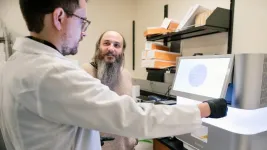(Press-News.org) BINGHAMTON, N.Y. -- Presenting the world’s smallest (and scrappiest) scuba diver: A species of semi-aquatic lizard produces a special bubble over its nostrils to breathe underwater and avoid predators, according to new research from Binghamton University, State University of New York.
Lindsey Swerk, an assistant research professor of biological sciences at Binghamton University, studies water anoles, a type of semi-aquatic lizard found in the tropical forests of southern Costa Rica. She had previously documented the lizards using a bubble underwater. When these lizards feel threatened by a predator, they dive underwater and breathe a bubble over their heads.
“We know that they can stay underwater for a really long time. We also know that they're pulling oxygen from this bubble of air,” said Swierk. “We didn’t know whether there was actually any functional role for this bubble in respiration. Is it something that lizards do that is just a side effect of their skin’s properties or a respiratory reflex, or is this bubble actually allowing them to stay underwater longer than they would, say, without a bubble?”
To investigate whether the bubble serves a functional role in respiration or is merely a byproduct, Swierk applied a substance to the lizards’ skin surface that would prevent bubble formation.
“Lizard skin is hydrophobic. Typically, that allows air to stick very tightly to the skin and permits this bubble to form. But when you cover the skin with an emollient, air no longer sticks to the skin surface, so the bubbles can't form,” said Swierk.
Swierk recorded the number of bubbles that the lizards could produce and how long they could stay underwater, and compared them to lizards in a control group that were allowed to breathe normally. She found that the lizards in the control group could stay underwater 32% longer than those with impaired bubble formation.
“This is really significant because this is the first experiment that truly shows adaptive significance of bubbles. Rebreathing bubbles allow lizards to stay underwater longer. Before, we suspected it – we saw a pattern – but we didn't actually test if it served a functional role,” said Swierk.
The study confirmed that the bubble helps lizards stay underwater for longer periods, providing them with a refuge from predators.
“Anoles are kind of like the chicken nuggets of the forest. Birds eat them, snakes eat them,” said Swiek. “So by jumping in the water, they can escape a lot of their predators, and they remain very still underwater. They're pretty well camouflaged underwater as well, and they just stay underwater until that danger passes. We know that they can stay underwater at least about 20 minutes, but probably longer.”
Going forward, Swierk wants to figure out whether lizards are using the bubble as something called a physical gill. A physical gill occurs in insects that use bubbles to breathe underwater. Insects have smaller oxygen requirements, and the amount of oxygen that diffuses from the water into the air of the bubble is enough to sustain them. Water anoles are likely too big to be supported merely by the oxygen that's diffusing into a bubble. One of Swierk’s graduate students, Alexandra Martin, is testing whether a physical gill-type action is allowing lizards to spend even more time underwater by changing the oxygenation of the water and measuring its effects on lizards’ dive time.
Swierk said that the research is exciting because scientists don't know much about vertebrate bubble use, which can open the door to bioinspired materials It’s also just interesting to learn about a new animal behavior.
“I've had people talk to me about how much they love scuba diving and freediving, and how they're interested in how animals might do the same thing,” said Swierk. “So there's a great opportunity to get people excited about science by having this relationship between what they love to do and what’s evolved in nature. Even in animals that seem commonplace – you're always finding new things.”
The paper, “Novel rebreathing adaptation extends dive time in a semi-aquatic lizard,” was published in Biology Letters.
END
‘Scuba-diving’ lizards use bubble to breathe underwater and avoid predators
Experiment shows bubble serves a functional role for water anoles
2024-09-17
ELSE PRESS RELEASES FROM THIS DATE:
USC launches large-scale nationwide study of type 1 diabetes and brain development
2024-09-17
About half of adults with type 1 diabetes face significant cognitive impairment, including problems with working memory and executive function that affect day-to-day thinking. But less is known about how the condition affects children during a window of time known to be critical for healthy brain development.
A new large-scale longitudinal study, led by the Keck School of Medicine of USC, will unite 12 research centers across the United States to explore that important question. Researchers will collaborate to recruit a large, diverse group of children newly diagnosed with diabetes, taking a sweeping look at the environmental, lifestyle, ...
Ancestry-specific genetic variants linked to multiple sclerosis risk, new study shows
2024-09-17
A landmark study has uncovered novel ancestry-specific genetic variants linked to multiple sclerosis (MS), offering new insights that could reshape treatment approaches for diverse populations affected by the disease.1 The research, presented today at ECTRIMS 2024, is the result of efforts by the Alliance for Research in Hispanic MS (ARHMS) Consortium and is the first large-scale study to identify ancestry-specific genetic effects for MS risk.
In a comprehensive analysis of over 7,000 individuals from self-reported Hispanic (n=4,313; 2,201 MS, 2,112 controls) and African American (n=3,085; 1,584 MS, 1,501 controls) backgrounds, researchers discovered ...
Early high-efficacy treatment significantly reduces long-term disability in children with multiple sclerosis, new study finds
2024-09-17
New research presented today at ECTRIMS 2024 reveals that initiating monoclonal antibody therapy during childhood, rather than delaying treatment until early adulthood, significantly reduces long-term disability in multiple sclerosis (MS) patients.1
The study, which utilised data from the French MS Registry, Italian MS Register, and the global MSBase Registry, analysed the outcomes of 282 patients with paediatric-onset MS who began experiencing symptoms before the age of 18 years. Patients were divided into two groups based on when they initiated monoclonal antibody treatment: either ...
Terasaki Institute CEO Dr. Ali Khademhosseini awarded the AIChE’s 2024 Andreas Acrivos Professional Progress
2024-09-17
Dr. Ali Khademhosseini, Ph.D., CEO and Director of the Terasaki Institute for Biomedical Innovation (TIBI), is honored with the 2024 Andreas Acrivos Award for Professional Progress in Chemical Engineering by the American Institute of Chemical Engineers (AIChE). This distinguished honor recognizes outstanding progress in the field of chemical engineering.
Named after Dr. Andreas Acrivos, Albert Einstein Professor of Science and Engineering, emeritus at the City College of New York, whose pioneering work in fluid ...
Slow-moving landslides a growing, but ignored, threat to mountain communities
2024-09-17
American Geophysical Union
17 September 2024
AGU Release 24-33
For Immediate Release
This press release is available online at: https://news.agu.org/press-release/slow-landslides-growing-threat-mountain-communities/
Slow-moving landslides a growing, but ignored, threat to mountain communities
Urban growth, climate change, and flood risk at lower elevations can push people to live on steeper, more dangerous terrain
AGU press contact:
Rebecca Dzombak, news@agu.org (UTC-4 hours)
Potsdam press contact:
Stefanie Mikulla, University of Potsdam, presse@uni-potsdam.de (UTC+2 hours)
Researcher contact:
Joaquin Vicente Ferrer, ...
Study finds thousands of browser extensions compromise user data
2024-09-17
Browser extensions, the software add-ons that help users customize and enhance their web browsers, are wildly popular. Some of the most-used extensions find shopping deals, fix grammar and typos, manage passwords, or translate web pages. The types of extensions available are nearly endless, and many have become indispensable tools for businesses and everyday users.
While these extensions can make web browsing more accessible, productive, and rewarding, they are not without risk. New research from Georgia Tech reveals that thousands of browser extensions pose significant threats to privacy, and hundreds automatically ...
Building better DNA editors: Retrons raise the bar for gene research
2024-09-17
SAN FRANCISCO—Within bacterial cells, specialized immune systems known as retrons fend off viral attacks. But that’s not all they can do.
Scientists, including Seth Shipman, PhD, at Gladstone Institutes, have shown that retrons also serve an important purpose in the lab: precise DNA editing. In fact, retrons can be combined with CRISPR—the far more famous bacterial-defense-system-turned-gene-editor—to better edit human cells.
Yet, for all their potential to help scientists better understand disease and develop new therapies, only a small number of retrons have been studied. In nature, many thousands of variations exist, some with greater gene-editing powers than ...
Study shows SIM models improve health data
2024-09-17
First-of-its-kind research by Tarang Parekh, assistant professor of epidemiology, reviewed the State Innovation Models (SIM), a payment system introduced by the Centers for Medicare and Medicaid Services in 2013, which provides financial incentives to states to develop innovative payment models to improve healthcare systems.
In the study, recently published in the American Journal of Epidemiology, Parekh compared data from 2010 to 2015 from three SIM participating states, Arkansas, Massachusetts and Vermont, to Florida, Nebraska and New Mexico, which do not participate in ...
Study suggests humor could help people engage with colorectal cancer information
2024-09-17
BUFFALO, N.Y. – Colorectal cancer (CRC) is no laughing matter. It’s the second-leading cause of cancer deaths globally, according to the World Health Organization. But new research led by the University at Buffalo suggests that humor can be an effective mechanism for reaching people who otherwise avoid information about colorectal cancer screening or other health messaging.
The research, published online ahead of print in the British Journal of Health Psychology, found that in people who demonstrated a ...
Q&A: Ethical decision-making around neurotechnology treatments
2024-09-17
UNIVERSITY PARK, Pa. — A novel neurotechnology treatment known as deep brain stimulation (DBS) can benefit patients with neurological disorders, but it involves surgical procedures with potential risks. Assessing the risk-benefit tradeoffs and the ethics in making decisions about whether to begin such treatments and when can be tricky for both patients and clinicians.
Laura Cabrera, associate professor of engineering science and mechanics, received a four-year, $1.5 million grant from the National Institutes of Health to research and develop ...
LAST 30 PRESS RELEASES:
Exercise and nutritional drinks can reduce the need for care in dementia
Michelson Medical Research Foundation awards $750,000 to rising immunology leaders
SfN announces Early Career Policy Ambassadors Class of 2026
Spiritual practices strongly associated with reduced risk for hazardous alcohol and drug use
Novel vaccine protects against C. diff disease and recurrence
An “electrical” circadian clock balances growth between shoots and roots
Largest study of rare skin cancer in Mexican patients shows its more complex than previously thought
Colonists dredged away Sydney’s natural oyster reefs. Now science knows how best to restore them.
Joint and independent associations of gestational diabetes and depression with childhood obesity
Spirituality and harmful or hazardous alcohol and other drug use
New plastic material could solve energy storage challenge, researchers report
Mapping protein production in brain cells yields new insights for brain disease
Exposing a hidden anchor for HIV replication
Can Europe be climate-neutral by 2050? New monitor tracks the pace of the energy transition
Major heart attack study reveals ‘survival paradox’: Frail men at higher risk of death than women despite better treatment
Medicare patients get different stroke care depending on plan, analysis reveals
Polyploidy-induced senescence may drive aging, tissue repair, and cancer risk
Study shows that treating patients with lifestyle medicine may help reduce clinician burnout
Experimental and numerical framework for acoustic streaming prediction in mid-air phased arrays
Ancestral motif enables broad DNA binding by NIN, a master regulator of rhizobial symbiosis
Macrophage immune cells need constant reminders to retain memories of prior infections
Ultra-endurance running may accelerate aging and breakdown of red blood cells
Ancient mind-body practice proven to lower blood pressure in clinical trial
SwRI to create advanced Product Lifecycle Management system for the Air Force
Natural selection operates on multiple levels, comprehensive review of scientific studies shows
Developing a national research program on liquid metals for fusion
AI-powered ECG could help guide lifelong heart monitoring for patients with repaired tetralogy of fallot
Global shark bites return to average in 2025, with a smaller proportion in the United States
Millions are unaware of heart risks that don’t start in the heart
What freezing plants in blocks of ice can tell us about the future of Svalbard’s plant communities
[Press-News.org] ‘Scuba-diving’ lizards use bubble to breathe underwater and avoid predatorsExperiment shows bubble serves a functional role for water anoles





